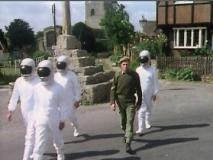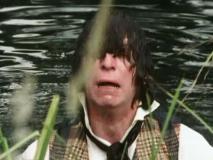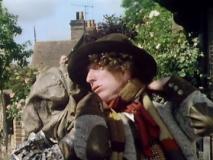 The penultimate episode in our series telling the story of the creation of Doctor Who, fifty years to the day after the events took place. On the last day before Doctor Who was first shown, there was good news and bad news for the production team, who were now hard at work on the second serial, which would begin its run in December. The good news was that, without an episode yet having been screened, they were to be given a run of longer than the 13 episodes previously guaranteed. The bad news was that, as with the very first episode, the opening instalment of Terry Nation's Dalek serial would have to be made again, this time for technical reasons. All of this, however, was about to be overshadowed by a tragic event in world history, one with which the beginning of Doctor Who would forever come to be associated.
The penultimate episode in our series telling the story of the creation of Doctor Who, fifty years to the day after the events took place. On the last day before Doctor Who was first shown, there was good news and bad news for the production team, who were now hard at work on the second serial, which would begin its run in December. The good news was that, without an episode yet having been screened, they were to be given a run of longer than the 13 episodes previously guaranteed. The bad news was that, as with the very first episode, the opening instalment of Terry Nation's Dalek serial would have to be made again, this time for technical reasons. All of this, however, was about to be overshadowed by a tragic event in world history, one with which the beginning of Doctor Who would forever come to be associated.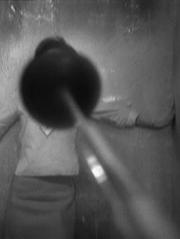
The news from Dallas did not come until the evening, so on the morning of
Friday 22 November 1963 - exactly fifty years ago today - the
Doctor Who production team had other matters on their minds. Earlier in the week, the Head of Serials
Donald Wilson had viewed a recording of
The Dead Planet, the episode which had been recorded the previous Friday, the 15th. Soon after it had been recorded, it had been noticed that the studio microphones had accidentally picked up the radio "talkback" between the production gallery and the headphones of the technical crew on the studio floor. Having viewed the episode, Wilson decided that there was no way it could be transmitted in its current state, and the only option would be to remount it from scratch, which would have to happen the following month. Fortunately, the production team were able to use the footage from the very end of the episode of
Barbara being threatened by the unseen Dalek, which was needed for the recap at the start of the second episode,
The Survivors, due to be recorded at Lime Grove that evening.
There were some concerns about the long-term effects of this event.
David Whitaker,
Doctor Who's story editor, was worried that the cast would need to have an extra week added to their contracts to ensure all episodes were completed before they moved on to other projects, but no such extra week had yet been arranged by the BBC contracts department. He wrote to Wilson to express his concerns about this, feeling unable to speak to producer
Verity Lambert about it as Barbara actress
Jacqueline Hill - a personal friend of Lambert's - had told him in confidence that she had been offered a role in a film on completion of her
Doctor Who contract. Whitaker wrote:
It may be sympathetic of a gradual lessening of confidence that the four contracted actors and actresses have in the serial itself. I think they are afraid that it is going to be taken off, and what worries me is that it will eventually affect their performances. Already I sense a certain laissez-fair attitude, and I would dearly love to stop this at birth. The only solution I can see is, of course, to tell them that the serial will continue after thirteen weeks, or not, as the case may be. Perhaps it is the indecision which is really making them feel insecure.
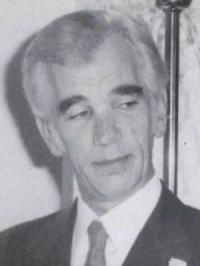
Spurred by this, Wilson wrote to
Donald Baverstock, the Controller of Programmes for BBC1 and the man ultimately responsible for deciding how many episodes of
Doctor Who would be made. Baverstock had already had cold feet about the show's future on one occasion,
almost stopping it entirely after the production of four episodes, but Wilson urged him to commit to another 13, to take the total to at least 26.
While Wilson was waiting for his answer, at 5pm on Thursday evening he, along with Lambert, Whitaker, Hill and her three co-stars
William Hartnell,
William Russell and
Carole Ann Ford, attended a press conference to help with the publicity for the launch of
Doctor Who. This took place at the Langham, a former hotel opposite the BBC's radio headquarters, Broadcasting House, which was now owned by the BBC.
On Friday, fifty years ago today, Wilson received the answer he wanted. Baverstock agreed to a commission of a further 13 episodes in addition to those already asked for, meaning
Doctor Who was now guaranteed a run of at least 26 weeks. The controller also made positive noises about a possible further 13, taking the total to 39, but told Wilson that he would not be able to make a firm decision on this until the New Year. After so much uncertainty about how many episodes would be made, or even if the series would make it to the screen at all, and following the headaches caused by the need to remake
The Dead Planet, this was the best news the
Doctor Who production team could have hoped for ahead of the show's launch the following day.
However, it was a launch that was about to be completely overshadowed by events totally outside of the control of anyone involved with
Doctor Who.
The news that President Kennedy had been shot in Dallas reached Britain at 6.42pm, as the cast and crew of
Doctor Who would have been preparing to begin work recording
The Survivors at Lime Grove. It was the first occasion upon which the cast had seen the Dalek props in full, with the operators having sat in just the lower halves of the casings for the rehearsals. As William Russell recalled in the BBC Radio 2 documentary
Doctor Who - 30 Years in 1993, this was the first moment when they realised that something special might be at hand.
We laughed at them when we saw them originally in the studio, because of course we saw them without their tops, with just an actor sitting in this sort of half-dustbin peddling himself around, and we thought they were ludicrous! But when they were all dressed up they weren't ludicrous, and when the sound was added,
Peter Hawkins's voice, you know, "I will exterminate you!" and all that business... Wonderful! And they became very frightening things.
Elsewhere in London, the Guild of Television Producers and Directors' annual dinner and ball was taking place at the Dorchester Hotel, with most of the senior executives from the BBC and ITV in attendance. When the man ultimately in charge of all BBC television,
Kenneth Adam, was reached at the event, he decided that normal programming should continue, even though Kennedy's death had been announced just before 7.30pm. The BBC went back to its scheduled programmes, showing comedy series
Here's Harry and Scottish medical drama
Dr Finlay's Casebook, a decision that drew thousands of complaints.
The BBC would be more careful and considered in its programming across the rest of the weekend, and over the following week. But
Doctor Who would go on as scheduled on Saturday evening. Just how much of the audience would be in any mood to watch it, and what if any impact it could make in the circumstances, would have to remain to be seen.
Compiled by:
Paul Hayes
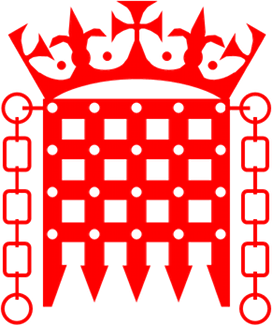 Tributes have been paid to Doctor Who in the House of Lords, the upper house of the UK Parliament.
Tributes have been paid to Doctor Who in the House of Lords, the upper house of the UK Parliament. 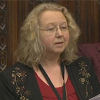 This debate necessarily starts with the record we have in public service broadcasting, of which the cornerstone is the BBC. BBC Worldwide is the largest TV programme distributor outside the major US studios, and its impact on the reputation of the United Kingdom overseas is one which increases our ability to trade worldwide and way beyond broadcasting. My noble friend Lady Bonham-Carter’s timing for this debate is perfect, following the amazing weekend marking the 50th anniversary of Doctor Who. Simulcast in 94 countries, setting a Guinness world record, with record-breaking figures in America, it was event TV drama at its best, delivered around the globe. That thrill of seeing all the Doctors saving Gallifrey is something my eight year-old son will remember until the 100th anniversary.
This debate necessarily starts with the record we have in public service broadcasting, of which the cornerstone is the BBC. BBC Worldwide is the largest TV programme distributor outside the major US studios, and its impact on the reputation of the United Kingdom overseas is one which increases our ability to trade worldwide and way beyond broadcasting. My noble friend Lady Bonham-Carter’s timing for this debate is perfect, following the amazing weekend marking the 50th anniversary of Doctor Who. Simulcast in 94 countries, setting a Guinness world record, with record-breaking figures in America, it was event TV drama at its best, delivered around the globe. That thrill of seeing all the Doctors saving Gallifrey is something my eight year-old son will remember until the 100th anniversary.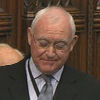 Our comic, eccentric and very British superhero, Doctor Who, who rightly has been much mentioned today, reached 50 last Saturday with a near-simultaneous broadcast in 94 different countries, as the noble Baroness, Lady Grender, mentioned. Nothing like that has ever happened before.
Our comic, eccentric and very British superhero, Doctor Who, who rightly has been much mentioned today, reached 50 last Saturday with a near-simultaneous broadcast in 94 different countries, as the noble Baroness, Lady Grender, mentioned. Nothing like that has ever happened before.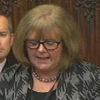 Programmes such as Doctor Who, Merlin and Sherlock and many others have been produced in Cardiff over a number of years but they are now produced in the BBC’s new drama facility in the recently built drama village at Roath Lock in the Porth Teigr, or Tiger Bay, area of Cardiff Bay. The drama studios there are the length of three football pitches, and more than 600 actors, camera operators and technicians are employed there—all, of course, contributing to the local economy.
Programmes such as Doctor Who, Merlin and Sherlock and many others have been produced in Cardiff over a number of years but they are now produced in the BBC’s new drama facility in the recently built drama village at Roath Lock in the Porth Teigr, or Tiger Bay, area of Cardiff Bay. The drama studios there are the length of three football pitches, and more than 600 actors, camera operators and technicians are employed there—all, of course, contributing to the local economy. Your Lordships have already mentioned Doctor Who. Its 50th anniversary special has just had a record-breaking global simultaneous broadcast—I am informed by officials that it is called a simulcast—that reached 94 countries across all the continents.
Your Lordships have already mentioned Doctor Who. Its 50th anniversary special has just had a record-breaking global simultaneous broadcast—I am informed by officials that it is called a simulcast—that reached 94 countries across all the continents.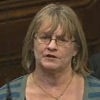
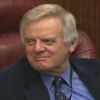 Finally, as Doctor Who has dominated the debate and I see my noble friend Lord Grade in his seat, I cannot resist wondering whether, had he known that Sylvester McCoy would regenerate into John Hurt, he would still have cancelled the programme?
Finally, as Doctor Who has dominated the debate and I see my noble friend Lord Grade in his seat, I cannot resist wondering whether, had he known that Sylvester McCoy would regenerate into John Hurt, he would still have cancelled the programme?  The Doctor Who Cuttings Archive is returning to the internet, courtesy of the Gallifrey Base forum.
The Doctor Who Cuttings Archive is returning to the internet, courtesy of the Gallifrey Base forum.  The BBC is looking for runners to work on Doctor Who in Cardiff.
The BBC is looking for runners to work on Doctor Who in Cardiff. 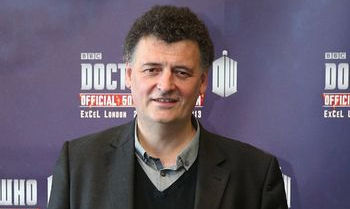 Doctor Who showrunner
Doctor Who showrunner
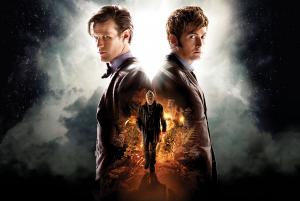 Australian Doctor Who fans set their alarms and tuned in to ABC1 as Doctor Who:
Australian Doctor Who fans set their alarms and tuned in to ABC1 as Doctor Who: 
 The final episode in our series of features telling the story of the creation of Doctor Who, and the people who made it happen.
The final episode in our series of features telling the story of the creation of Doctor Who, and the people who made it happen. Despite events in Dallas, the schedules on BBC Television for Saturday were relatively unaffected by the news. It was the days before rolling news and continuous live updates. Grandstand, the long-running sports programme, was on air as usual, with live coverage of rugby union, where Cardiff were playing New Zealand, forming the bulk of the afternoon. A 1'47" news flash had been broadcast at 4pm, with Corbet Woodall bringing viewers up to date with events from America. Grandstand came off air just after 5.15pm and was followed by a 50-second presentation junction looking ahead to the evening's entertainment, which included Juke Box Jury, with Cilla Black, Sid James, Don Moss and Anna Quayle, the police series Dixon of Dock Green, the American series Wells Fargo and the Saturday film Santa Fe Passage.
Despite events in Dallas, the schedules on BBC Television for Saturday were relatively unaffected by the news. It was the days before rolling news and continuous live updates. Grandstand, the long-running sports programme, was on air as usual, with live coverage of rugby union, where Cardiff were playing New Zealand, forming the bulk of the afternoon. A 1'47" news flash had been broadcast at 4pm, with Corbet Woodall bringing viewers up to date with events from America. Grandstand came off air just after 5.15pm and was followed by a 50-second presentation junction looking ahead to the evening's entertainment, which included Juke Box Jury, with Cilla Black, Sid James, Don Moss and Anna Quayle, the police series Dixon of Dock Green, the American series Wells Fargo and the Saturday film Santa Fe Passage. 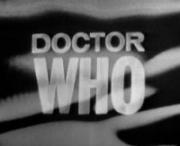 It was at exactly 16 minutes and 20 seconds past five that the opening titles of Doctor Who ran and the nation was introduced to a brand-new science fiction series.
It was at exactly 16 minutes and 20 seconds past five that the opening titles of Doctor Who ran and the nation was introduced to a brand-new science fiction series. 



 The news from Dallas did not come until the evening, so on the morning of Friday 22 November 1963 - exactly fifty years ago today - the Doctor Who production team had other matters on their minds. Earlier in the week, the Head of Serials
The news from Dallas did not come until the evening, so on the morning of Friday 22 November 1963 - exactly fifty years ago today - the Doctor Who production team had other matters on their minds. Earlier in the week, the Head of Serials  Spurred by this, Wilson wrote to
Spurred by this, Wilson wrote to 

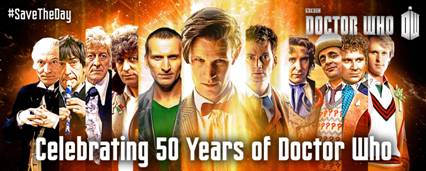 BBC Worldwide is collecting images of fans around the world celebrating the 50th Anniversary of Doctor Who this weekend.
BBC Worldwide is collecting images of fans around the world celebrating the 50th Anniversary of Doctor Who this weekend. 
